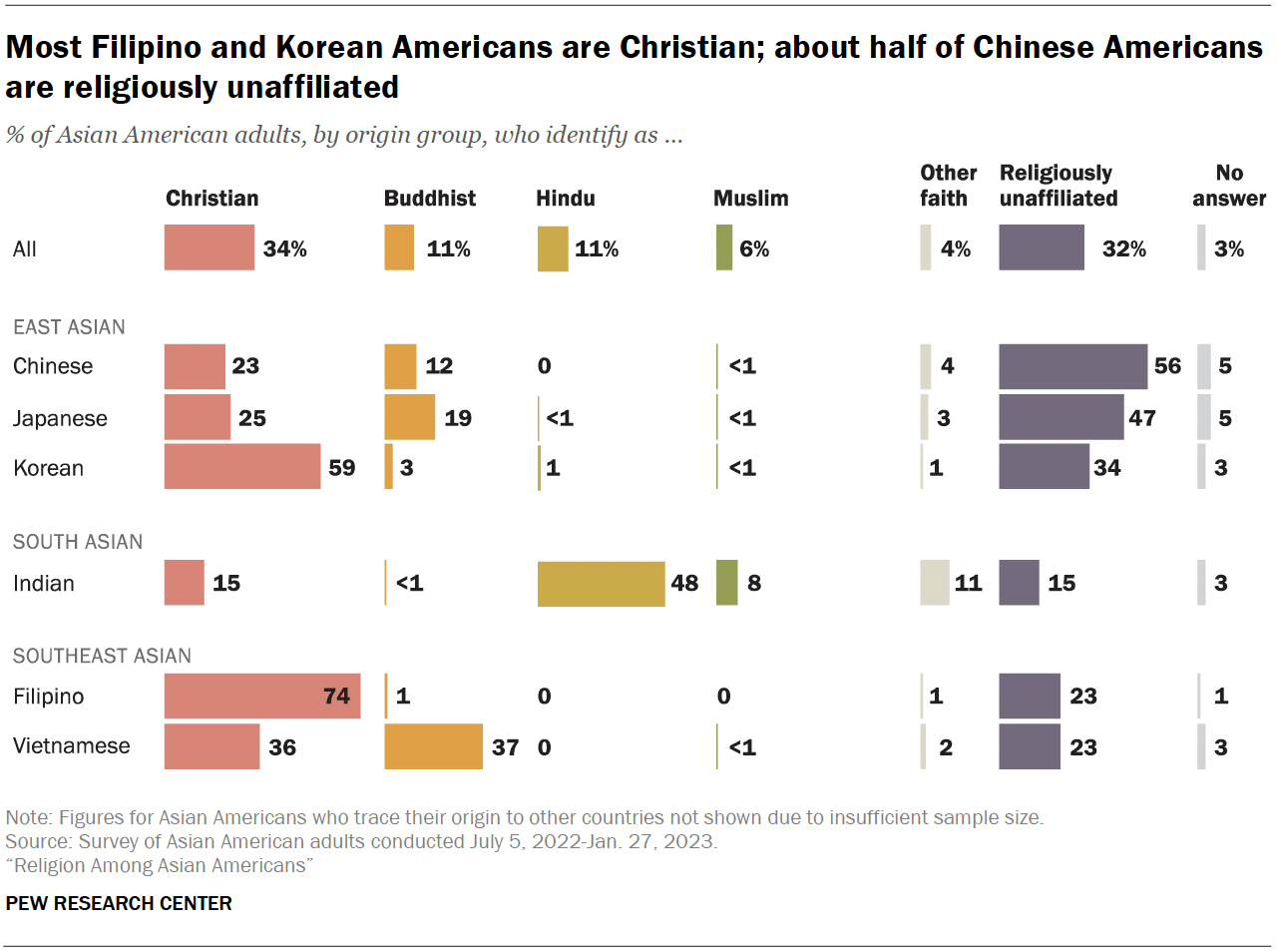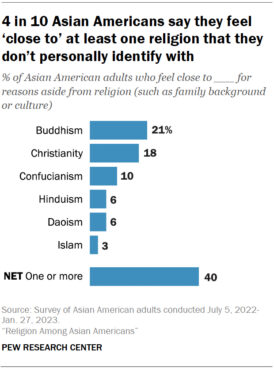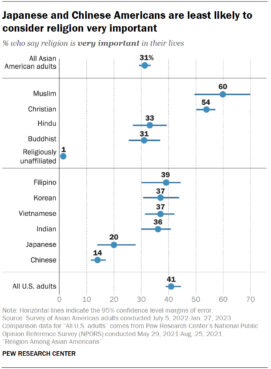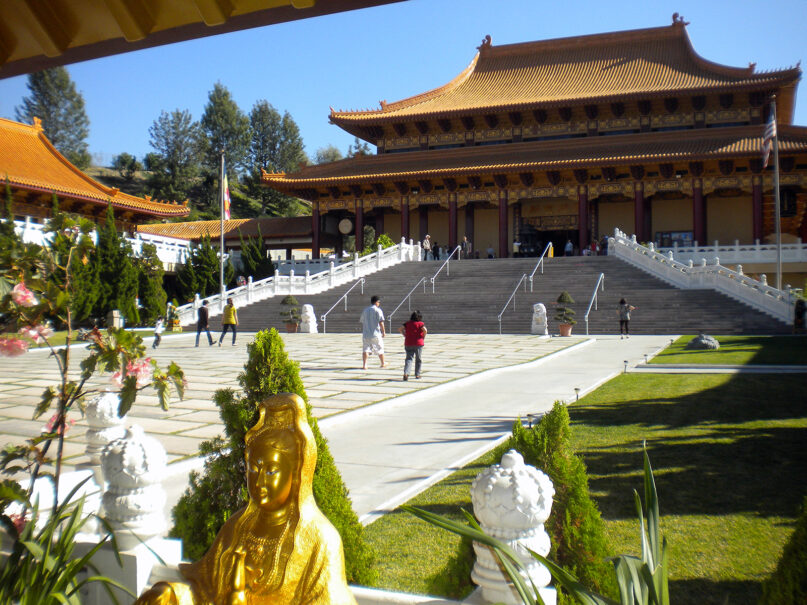(RNS) — More Asian Americans identify as atheist, agnostic or nonreligious than before, according to a survey released Wednesday (Oct. 11) by Pew Research Center. But 40% of those Pew surveyed, who included Americans of Chinese, Filipino, Indian, Japanese, Korean and Vietnamese backgrounds, said they feel close to a religion for reasons aside from religion, such as family or cultural ties.
Pew’s survey, which studied over 7,000 participants over the course of a year, found that Asian Americans are part of the ongoing trend of Americans who don’t follow any religion, often referred to as “nones.” Today, 32% of Asian Americans are religiously unaffiliated, compared with 26% in 2012.
Asian Americans as a whole are mostly Christian (34%), especially Korean (59%) or Filipino Americans (74%), who are evenly split between Protestantism and Catholicism (16% and 17%). Born-again or evangelical Protestants make up 10% of Asian Americans.
But it is those Asian Americans who identify as Christians who have shown the sharpest declines in affiliation with religious institutions since 2012, dropping by 8 percentage points.
Some 56% of Chinese Americans and 47% of Japanese Americans said they are not affiliated with any religion, comprising the largest groups of religious nones. They are also the groups least likely to consider religion very important.

“Most Filipino and Korean Americans are Christian; about half of Chinese Americans are religiously unaffiliated” Graphic courtesy of Pew Research Center
Buddhists and Hindus, both at 11%, were the next largest faith groups. Vietnamese Americans are the most likely of the Asian origin groups to identify as Buddhist (37%), and Indian Americans are far more likely than the other groups to be Hindu (48%).
The survey’s findings reflected a complex understanding of religiosity in many Asian American cultures, in which religious identity can mean more than just adhering to a set of beliefs. In particular, daily life in Asian countries can be infused with practices associated with Buddhism, Hinduism, Daoism, Shintoism and Confucianism, even among those who do not identify as religious.
One Vietnamese Buddhist told the researchers, “Confucianism and Daoism is part of my culture. However, for me, it’s a school of philosophy. I do not identify myself as being a Daoist or Confucian.”

“4 in 10 Asian Americans say they ‘feel close’ to at least one religion that they don’t personally identify with” Graphic courtesy of Pew Research Center
While only 11% of Asian American adults say their religion is Buddhism, for example, 21% feel close to Buddhism for other reasons.
Religiously unaffiliated Indian Americans report this phenomenon at much higher rates than nones of other Asian origin groups, saying they feel close to Hinduism for reasons aside from religion.
Many Asian Americans also reported feeling an affinity toward more than just one religion, the survey found. Four in 10 Asian American adults expressed a cultural connection to one or more groups that they do not claim as a religious identity, but still feel close to.
One Hindu participant expressed a connection to Buddhism “because some of the practices of Buddhists, they are very much similar” to Hindu practices.
And a Muslim participant drew parallels between Islam and Christianity, telling researchers, “In Islam and in Christianity there’s a lot common.”
The survey found that 18% of Asian Americans do not identify religiously as Christian, yet say they feel close to Christianity aside from religion, including, for example, the American celebration of Christmas.
“My whole life I was exposed to Christmas and all this stuff. Even though I don’t believe in it, we had to give gifts … so it was always part of our culture, even though we don’t believe in it,” said one non-Christian Indian participant who grew up in the U.S.

“Japanese and Chinese Americans are least likely to consider religion very important” Graphic courtesy of Pew Research Center
On the whole, Asian Americans are slightly less likely than Americans as a whole to say religion is very important in their lives, the survey says.
Asian American Muslims (60%) and Christians (54%) are much more likely to feel that religion is very important in their lives than are Asian American Hindus (33%) and Buddhists (31%), and are also the likeliest to say they attend religious services or visit a temple, shrine or other religious space at least monthly.
Regular religious attendance is more common among Korean and Filipino Americans than among Vietnamese, Japanese or Chinese Americans. And as a whole, Asian Americans born in a country other than the U.S. are far more likely than those born here to say they attend religious services at least monthly (32% versus 21%).
Twenty-one percent of all Asian Americans surveyed said they attend services at least weekly.
Worship trends vary among traditions, but 36% of Asian Americans say they have an altar, shrine or religious symbol that they use for home worship. Of those who do, many identify as Buddhist or Hindu.
But worshipping at home is also fairly common among Catholic Filipino Americans, with 66% of them saying they have an altar at home.
As many Asian Americans expressed a dual-belonging with more than one religion, 30% of Asian Americans said all or most of their friends have the same religion they do. Seventy-seven percent of Asian Americans say they would be comfortable if a family member married outside of their faith.





